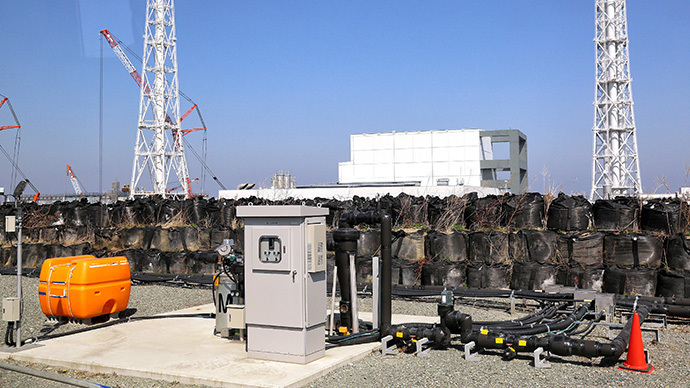| « 9/11: Russia Presents Evidence Against US, UK And Israel Co-Conspirators? | What is "Federal" about Federal Express? » |
Fukushima has 9 days to prevent ‘unsafe’ overheating

RT.com
Fukushima operator TEPCO has been forced to switch off the cooling system at mothballed Reactor Unit 5, after it was discovered that it had been leaking water. In nine days, if the system is not repaired, temperatures will exceed dangerous levels.
Engineers have discovered that 1,300 liters of water leaked from a cooling system intended to stabilize the temperature of the spent fuel at the Reactor Unit 5, which was offline but loaded with fuel rods when the plant was damaged by the earthquake and tsunami in March 2011.
The source of the leak was a 3 mm-diameter hole near a flow valve, a statement published by the Japanese energy giant on Sunday asserts. However it is unclear from company data if the location of the opening has been discovered, or whether it was calculated with flow measurements.
At the time when the cooling system was switched off at around 12pm on Sunday, the temperature in the pool in which the rods are submerged was 23C but started increasing by 0.193 degrees per hour, TEPCO says.
If no new cold water is pumped in at such rate it will reach the dangerous threshold of 65C by the midpoint of the month in roughly 9 days.
Such temperatures, which have not been routinely seen at the plant since the failing of the cooling system in the immediate aftermath, would increase the possibility of dangerous reactions and further radiation leaks in the plant.
TEPCO however says that currently, there have been no abnormal readings anywhere in the plant.

Since TEPCO is using seawater for many of its cooling needs at the power plant, it has previously encountered heightened levels of corrosion, in sensitive equipment. The cooling system at various reactors has also been beset by calamities – from rats short circuiting the control panel and forcing a blackout, to an employee “accidentally” switching it off, though all were resolved before rod pools overheated.
At the same time, TEPCO is struggling to deal with ever-increasing volumes of contaminated water which is being stored in hundreds of tanks at the facility and frequently leaking and contaminating the soil beneath it. And the much publicized plan to stop contaminated water from leaking into the sea by building an ‘ice-wall’ and freezing soil and water around the facility is not working as well as Japanese officials had hoped.


